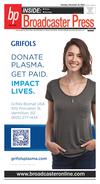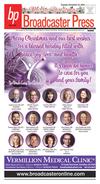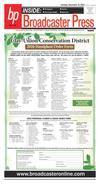9
Broadcaster Press 9
May 19, 2015 www.broadcasteronline.com
To all those whose office
phone number is 9-1-1,
thank you, Clay County EMS
VERMILLION COMMUNITY CPR TRAINING
Sponsored by:Vermillion/ Clay County EMS Association & Sanford Health Vermillion
All classes are held at the William J. Radigan Fire/ EMS Station located at 820 N.
Dakota Street,Vermillion, SD. Please park in the North West visitor lot (off Duke St.).
Call 605-677-7053 or email vermillioncpr@gmail.com to sign up.
All CPR classes include Adult, Child, Infant and AED.
Healthcare Provider Course:................................... $40.00 per student.
Heartsaver Course:.................................................... $35.00 per student.
All First Aid classes:.................................................... $30.00 per student.
Sanford Health Employees:......................................$10.00.
Make checks payable to:Vermillion Community CPR
Upcoming Classes
Fifty-two percent of
patients in rural areas with
severe heart attacks drove
themselves to the hospital
or were driven in instead of
calling 911.
MAY 12.............................................. 6PM (HEALTHCARE PROVIDER)
JUNE 9............................................... 6PM (HEALTHCARE PROVIDER)
JULY 14.............................................. 6PM (HEALTHCARE PROVIDER)
AUGUST 11..................................... 6PM (HEALTHCARE PROVIDER)
SEPTEMBER 8.................................. 6PM (HEALTHCARE PROVIDER)
OCTOBER 13.................................. 6PM (HEALTHCARE PROVIDER)
NOVEMBER 10............................... 6PM (HEALTHCARE PROVIDER)
DECEMBER 8................................... 6PM (HEALTHCARE PROVIDER)
HEART
E
M
S
CALL
ATTACK 911
KNOW THE SIGNS.
ACT IN TIME.
If you or someone you are with begins to have one or more
of the symptoms of a heart attack, call 9-1-1 right away...
Don’t wait.
Don’t make excuses.
Don’t drive yourself
to the hospital.
IMMEDIATELY
Know the signs:
Pain in the chest, jaw, neck, back
or arms
Shortness of breath
Nausea/Sweating
Rural 911 Data Released
Arriving to the hospital by ambulance speeds up lifesaving treatment for heart attack patients in rural areas and
confirms the important role paramedics have in expediting
care, according to new research from the American Heart
Association’s Quality of Care and Outcomes Research 2015
Scientific Session being published in the AHA Journal, Circulation, Cardiovascular Quality and Outcomes.
When comparing arrival times, researchers found:
• Patients brought to the hospital by ambulance took an
average of about 26 minutes to get there compared with an
average of 38 minutes for patients who drove themselves.
• The average time from hospital arrival to undergoing
artery-opening procedures in the cardiac catheterization
lab was an average of 42 minutes for those who traveled
by ambulance versus 57 minutes for those who drove
themselves.
“The biggest implication is raising awareness so the
public understands the vital role of EMS in healthcare,”
said lead study author John M. Gallagher, M.D., EMS Medical Director, Winona Area Ambulance Service in Winona,
Minnesota. “EMS continues to be viewed as only a ‘ride’
but utilizing EMS as part of the healthcare system not only
allows for treatment from the time they arrive at your door,
but also has been proven to shorten time to reperfusion
treatment faster.”
The study did not investigate why patients chose not
to call 911 and instead find their own transportation to the
hospital. Gallagher said the public needs to learn to trust
EMS providers, who are skilled in responding to a heart attack and can activate care much more quickly than patients
seeking care on their own.
“The public needs to start seeing EMS as the first access
point to health care,” he said. “EMS providers have a plan
in place for inclement weather and travel conditions. Their
unique capabilities to delivery lifesaving care en-route to
the hospital should not be underestimated. The benefits of
20 minutes saved in their heart attack timeline are huge.”
Every year, more than 250,000 Americans have a STEMI
heart attack. Every minute counts in getting life-saving
treatment to these patients, however, many of them do not
get the care they need in the time frames they need them.
The American Heart Association created Mission: Lifeline
to enhance existing STEMI systems of care and integrate
out-of-hospital cardiac resuscitation and other life-saving
techniques into these systems to improve patients’ chances
for survival.
Know Your NUMBERS
Doctors use results from the screenings below to help them assess the quality of your health. High numbers
can indicate that you are at risk for developing heart disease, stroke, diabetes and several forms of cancer.
Blood Glucose Blood Pressure
Know about Blood
Glucose
Know about Blood
Pressure
A blood glucose test
measures the amount
of sugar in the blood.
It is used to help
diagnose diabetes and
to monitor those who
already have diabetes.
Blood pressure
readings can vary
greatly depending on
when and where you
take them and the
type of monitor used.
Alert your doctor
if your readings are
consistently over
140/90
Blood Glucose
Ranges
•Less than 100mg/dL=
Normal
•100-125mg/dL=
Impaired/Prediabetes
•126 or higher=
Diabetes
Age 18-44: If you are
overweight and have
other risk factors, as
directed by doctor.
Age 45 & over: Every
3 years or as directed
by doctor.
Blood Pressure
Ranges
Cholesterol
BMI
Know about Cholesterol
Weight
Cholesterol is a fat-like substance that
can clog arteries, leading to heart disease.
Cholesterol tests check the levels of your
total blood cholesterol, LDL, HDL and
triglycerides.
Know about Body Composition
Total Blood Cholesterol
•Less than 200mg/dL=
Desirable
•200-239mg/dL=
Boarderline High
•240mg/dL or higher=
High
LDL (Your actual LDL goal
HDL
Less than 40mg/dL for men
and 50mg/dL for women
increases the risk for heart
disease. An HDL level of
60mg/dL or more helps
lower your risk for heart
disease.
•Less than 120/80=
Optimal
depends on your other heart
disease risk factors. Talk to your
doctor.)
Triglycerides
•Less than 150mg/dL=
Normal
•120-139/80-89=
Prehypertension
•Less than 100mg/dL=
Optimal
(at increased risk for
developing high blood
pressure)
•150-199mg/dL=
Boarderline High
•100-129mg/dL=
Neat/Above Optimal
•200-499mg/dL=
High
•140/90 or higher=
High Blood Pressure
•130-159mg/dL=
Boarderline High
•500mg/dL or higher=
Very High
Age 20 & over: Every
1-2 years; more
frequently if over
140/90 or as directed
by doctor.
Waist Measurment
•160-189mg/dL=
High
Body mass index (BMI) is a measure of
your weight relative to your height.Your
waist measurement indicates abdominal
fat. In combination, these numbers indicate
whether you are overweight or obese and at
risk for a variety of health problems
BMI Levels
Waist Measurement
•Below 18.5=
Underweight
Men
Over 40” indicates
increased risk for
weight-related
problems
•18.5-24.9=
Normal
•25.0-29.9=
Overweight
30.0 and over=
Obese
(To calculate your BMI,
see the Centers for
Disease Control and
Prevention website at
www.cdc.gov/nccdphp/
dnpa/bmi)
•190mg/dL or higher=
Very High
KNUTSON FAMILY DENTISTRY
THANK YOU
Thank You
Dr. Richard Knutson • Dr. Matthew Knutson
1714 East Cherry Street, Vermillion
605.624.6291
for your service!
HERREN • SCHEMPP
BUILDING SUPPLY
Locally Owned & Operated
888-624-2058 • 605-624-2058
Caring Professional Staff • Excellence in Dentistry
Women
Over 35” indicates
increased risk for
weight-related
problems
for all that you do
1000 W. Cherry St.•Vermillion, SD
www.herrenschempp.com
525 W Cherry St
Vermillion, SD 57069
(605) 624-5574
Vermillion
THANK YOU
THANK YOU
Clay County
EMS
624 –5555 Vermillion • 111 Court Street
firstdakota.com Member FDIC
Thank you EMS for
all you do!
101 W. Cherry, Vermillion
624-8624 • 800-624-6690
www.vermillionford.com
FIREFIGHTERS
Personel
105 East Cherry Street • Vermillion, SD 57069
(605) 677– 5214 • www.vermillionfcu.com

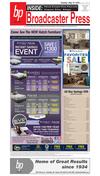
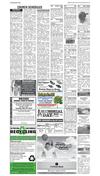
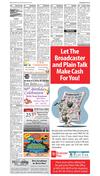
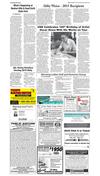
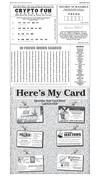
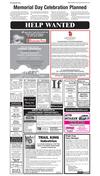
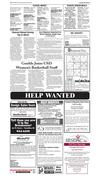
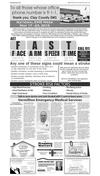
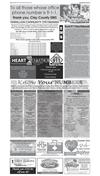
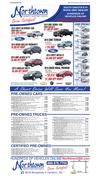
 Previous Page
Previous Page


